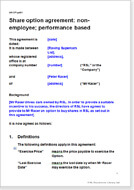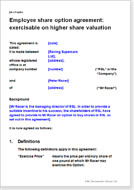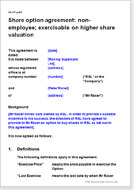Easy to use agreements
These four agreements are very similar in structure and content. The only differences relate to:
- whether your counter party is an employee or a third party
- whether the exercise of the option is to be triggered by increased personal performance or by a higher valuation
What event triggers the option in your case is obviously very important. Since that could be unique for your business, we have used “performance” and “higher share price” as the most likely and allow you to specify in more detail, if required, the exact conditions.
The documents are structured so that the trigger can be set down in a schedule. You do not have to edit the main paragraphs in the document.
Once the document is signed and dated, it is legally binding. Just because the details are in the schedule rather than the main document does not mean they can be changed without agreement by all parties.
We have provided for your counter party to pay for the option and also to pay for the shares on exercising it. Either or both provisions may be deleted or the sums increased or reduced.
Also consider a new shareholders’ agreement
This would also be a good time to put into place a new shareholders’ agreement whilst you are in charge of the shares. If you wait until the option holder is a new shareholder, you will have to take greater account of what he wants!
The law relating to these agreements
This document is drawn under basic contract law. There are no special rules, tax arrangements, or other legal complications that need to be considered with an agreement of this type.









